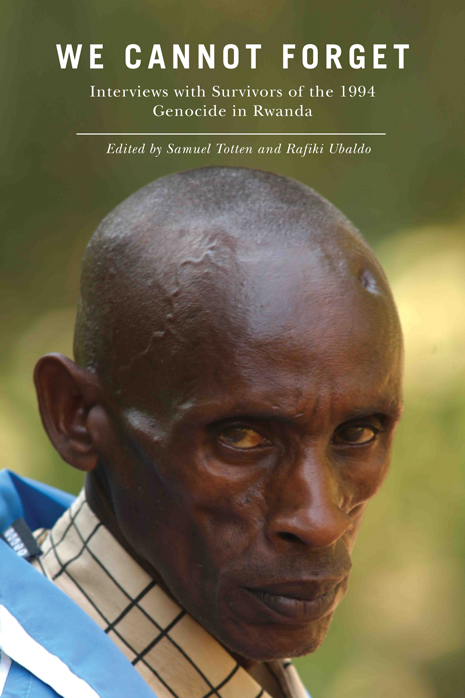The Time to Prevent Genocide Is Now
FAYETTEVILLE, Ark. – In We Cannot Forget, genocide scholar Samuel Totten of the University of Arkansas seeks to educate people across the globe about the 1994 Rwandan genocide. He also wants the book’s readers to take away the message that the time to prevent genocide is “when basic human rights are being violated on a systematic basis, when threats against particular groups become common occurrences and when periodic massacres are perpetrated.”
In 1994, Hutu extremists and their followers murdered between 500,000 and 1 million Tutsis in Rwanda. We Cannot Forget, which was co-edited by Rafiki Ubaldo, includes a wide array of personal interviews with survivors who were living in Rwandan cities, towns and villages during that time. It also reflects upon what the victims’ lives were like prior to, during and following the genocide.
“For many of the interviewees and survivors whose stories are presented in this book, extreme sadness and lack of hope are their daily companions,” Totten said.
Two years before beginning work on the book, Totten spent months interviewing both former Hutu and Tutsi citizens in Rwanda about their views of the “gacaca” process, which is an indigenous and pre-colonial form of conflict resolution. It was adapted to try the 150,000 suspects alleged to have taken part in the 1994 genocide. As survivors’ stories unfolded about the genocide, he believed that these events needed not only to be told but also published.
“The stories that the people told were harrowing, and the memories of and the retelling of such stories resulted, as you can imagine, in great grief for those who related them,” Totten said.
These individuals witnessed family and friends being raped and slaughtered with machetes and other farm implements, “not for anything they had done but simply for who they were,” Totten said. In each interview, survivors revealed how “certain sounds, smells, sights bring back certain moments of the genocide, and it is as if they are living the experience, the horrors, all over again.”
 Samuel Totten, University of Arkansas Samuel Totten, University of Arkansas |
Some survivors also mentioned that they were just finding out, in 2008, roughly 14 years after the genocide, where their family and friends had been killed and buried. “I actually witnessed the removal of 35 bodies from a latrine where people had been tossed in dead and half dead during the genocide,” Totten said.
Totten is interested in learning more about this genocide by determining what caused Hutus to risk their own lives in order to save Tutsis from certain death. He is also interested in discovering the experiences of the Twa, known as pygmies, during the genocide. This group of people represented about 1 percent of the population in Rwanda before the genocide and lost a much greater percentage of their population to the genocide than did the Tutsi people.
Totten believes that any human being who cares about another human being must speak up, take action and not leave the hard work of decrying human rights transgressions to someone else.
“Being one’s brothers’ and sisters’ keeper is possibly the most honorable action one can take in life,” said Totten.
Totten is a professor of curriculum and instruction in the College of Education and Health Professions at the University of Arkansas. We Cannot Forget is published by Rutgers University Press, 2011.
Topics
Contacts
Samuel Totten, professor
College of Education and Health Professions
479-575-6677,
stotten@uark.edu
Loreal E. Robertson, intern
University Relations
479-575-4966,
lxr008@uark.edu
Barbara Jaquish, science and research communications officer
University Relations
479-575-2683,
jaquish@uark.edu
Headlines
PetSmart CEO J.K. Symancyk to Speak at Walton College Commencement
J.K. Symancyk is an alumnus of the Sam M. Walton College of Business and serves on the Dean’s Executive Advisory Board.
Faulkner Center, Arkansas PBS Partner to Screen Documentary 'Gospel'
The Faulkner Performing Arts Center will host a screening of Gospel, a documentary exploring the origin of Black spirituality through sermon and song, in partnership with Arkansas PBS at 7:30 p.m. Thursday, May 2.
UAPD Officers Mills and Edwards Honored With New Roles
Veterans of the U of A Police Department, Matt Mills has been promoted to assistant chief, and Crandall Edwards has been promoted to administrative captain.
Community Design Center's Greenway Urbanism Project Wins LIV Hospitality Design Award
"Greenway Urbanism" is one of six urban strategies proposed under the Framework Plan for Cherokee Village, a project that received funding through an Our Town grant from the National Endowment for the Arts.
Spring Bike Drive Refurbishes Old Bikes for New Students
All donated bikes will be given to Pedal It Forward, a local nonprofit that will refurbish your bike and return it to the U of A campus to be gifted to a student in need. Hundreds of students have already benefited.





